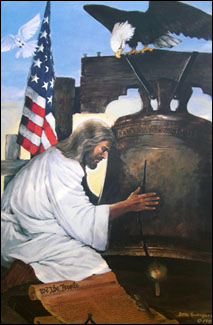The Exceptionalism That Proves the Rule (original) (raw)

The phrase “American exceptionalism” has become a rather confusing one, in that it gets tossed around a lot, but it’s not entirely clear what it means.
It’s sort of like “political correctness” in that respect. Does it mean general politeness and not using slurs to refer to ethnic groups, or does it mean nobody should ever say anything even remotely controversial? And does it really have anything to do with politics in this day and age? American exceptionalism is a much older concept, however, with Wikipedia claiming that its origins lie largely with French writer Alexis de Tocqueville, who wrote, “The position of the Americans is therefore quite exceptional, and it may be believed that no democratic people will ever be placed in a similar one.” Mind you, he returned to France after visiting the States for a while. In 1929, a translation of Joseph Stalin’s criticism of a particular branch of the American Communist Party used the actual phrase in a negative way, referring to those who thought the United States would not have to undergo a Marxist revolution. And I guess if Uncle Joe used the term negatively, Americans could use it positively. Mind you, I do have to wonder if Republicans who use it now are aware of how its history is tied up with communism. In the early twenty-first century, the term came to be used to mean the States should be exempt from international law. It’s also tied to the notion of the city upon a hill, which originates in Matthew 5:14 and was used by Puritan settlers in America to indicate that their community was a role model for other nations.
President Ronald Reagan would later add the word “shining” to the expression, and this form might well be more common nowadays, at least in the States.
It’s actually mentioned in Douglas Adams’ short story “Young Zaphod Plays It Safe,” in which it’s explained that Reagan was an artificially created person who ended up on Earth when a spaceship pilot stopped here for lobster. Hey, why not?

The modern politician who might be most commonly associated with American exceptionalism is Mitt Romney, who combined it with the idea that our nation should never apologize. He’s sorry, but that’s just the way we are. Romney is a Mormon, and while the concept didn’t originate with Mormonism, it’s a significant part of their theology. Joseph Smith taught that America was settled by Jews who escaped Judah before the Babylonian conquest, that they worshipped Jesus long before he was actually born, that Jesus himself spent time in America, that the Constitution was inspired by God, and that the Garden of Eden was in Missouri. (Actually, there’s no record of Smith actually saying this last thing, but it’s become Mormon doctrine.) The Mormons were not the first to posit that Paradise was located in the Americas; Christopher Columbus apparently thought it was in Venezuela. I’m inclined to think that this was because much of America was unspoiled wilderness at this point. Europe probably looked much the same before people built all over it. Anyway, from what I’ve been able to gather, Mormons not only believe that the United States is exceptional, but that they are destined to save it. So it’s not too surprising that Romney would go along with this, and hope that people forget that his great-grandfather fled this earthly paradise so he could marry multiple women.
This entry was posted in Christianity, Communism, Economics, History, Mormonism, Politics, Religion and tagged alexis de tocqueville, american communist party, american exceptionalism, bible, christopher columbus, city upon a hill, garden of eden, gospel of matthew, jesus, joseph smith, joseph stalin, mitt romney, political correctness, president george w. bush, president ronald reagan, young zaphod plays it safe. Bookmark the permalink.